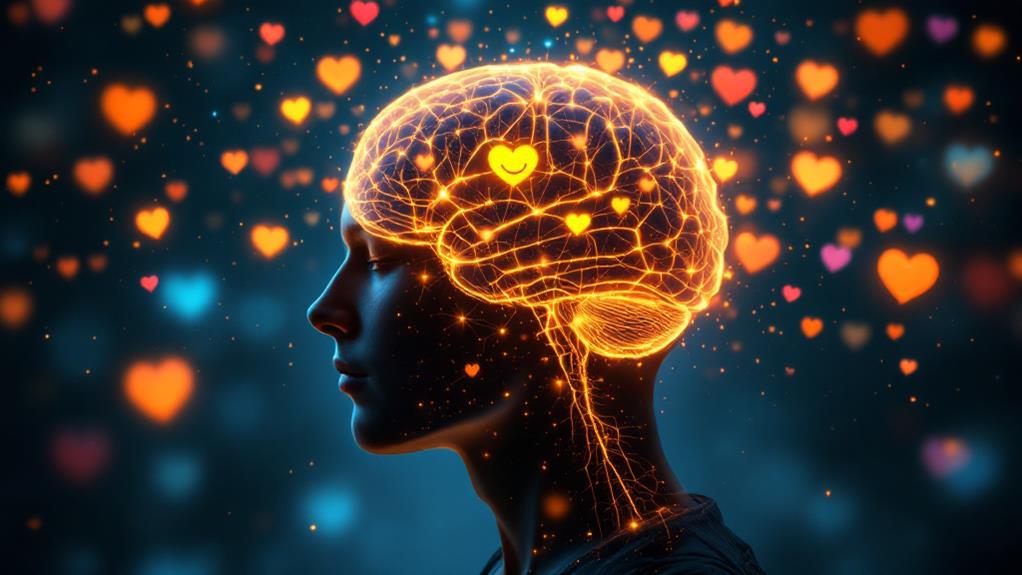The Science Behind Random Acts of Kindness: Why It Feels So Good

Random acts of kindness aren't just good for others; they're scientifically proven to benefit your own health and happiness. When you're kind, your brain releases oxytocin, the "love hormone," along with serotonin and dopamine. This chemical cocktail creates a "helper's high," reducing stress and improving your mood. You'll also experience lower blood pressure, decreased pain, and an enhancement to your immune system. Surprisingly, you're likely underestimating the positive impact your kind gestures have on others. Kindness is contagious, sparking a ripple effect that can revolutionize communities. Uncover how simple acts of compassion can tremendously alter your life and those around you.
The Oxytocin Connection
Oxytocin, the unsung hero of human connection, plays a starring role in the feel-good effects of random acts of kindness. This "love hormone" is released when you engage in acts of kindness, cultivating social bonding and trust between individuals. As you perform kind deeds, your oxytocin levels surge, leading to a cascade of positive effects on your body and mind.
Research has shown that these increased oxytocin levels can drastically impact your physical health. You'll experience lowered blood pressure and improved heart health, contributing to your overall well-being. But the benefits don't stop there. The oxytocin boost from kindness also enhances your mood and creates a greater sense of positivity in your life.
Scientists are now exploring oxytocin's potential in treating various mental health conditions and social disorders. Its natural ability to strengthen bonds between people, similar to its role in physical intimacy and breastfeeding, makes it a promising avenue for therapeutic interventions. By understanding the science behind kindness and oxytocin, you can leverage the power of this hormone to improve both your physical and mental health through simple acts of generosity.
Brain Chemistry of Kindness
Beyond oxytocin, the brain's response to kindness involves a concerto of neurotransmitters working in concert. When you perform or witness an act of kindness, your brain releases a powerful cocktail of chemicals, including serotonin and dopamine. These neurotransmitters trigger the brain's reward centers, creating a "helper's high" that's similar to the euphoria you might experience after exercising.
This chemical reaction doesn't just make you feel good momentarily; it has lasting effects on your overall well-being. Regular acts of kindness can:
- Lower your stress levels by reducing cortisol production
- Improve your cardiovascular health by releasing nitric oxide
- Augment your immune system and reduce inflammation
The brain's response to kindness isn't limited to the person performing the act. When you observe others being kind, your brain also lights up in the same pleasure and reward regions. This neurological response encourages you to pay it forward, creating a ripple effect of positivity in your community.
Underestimating Our Impact
Despite the powerful effects of kindness, we often underestimate the impact our acts of goodwill have on others. The science behind kindness reveals that people consistently undervalue the positive effects of their compassionate actions. You might want to perform more random acts of kindness but hesitate, thinking they won't matter as much as they actually do.
This underestimating of our impact stems from a misconception about the value of our kind gestures. In reality, acts of kindness can have a significant influence on others' wellbeing, creating opportunities for happiness that are frequently overlooked. When you perform an act of kindness, you're not just offering the act itself; you're conveying that you care and want the recipient to feel good. This emotional connection often means more to the recipient than the act's face value.
Understanding the true impact of your kindness can increase your self-esteem and motivate you to engage in more compassionate behaviors. By recognizing that your actions trigger feel-good chemicals in both yourself and others, you'll be more likely to seize opportunities for kindness in your daily life.
Kindness as Contagious Behavior
While we often underestimate our impact, the power of kindness extends far beyond the initial act. Science has shown that kindness is contagious, spreading like a positive virus through social interactions. When you perform a random act of kindness, you're not just affecting the recipient; you're potentially triggering a chain reaction of goodwill.
Studies reveal that witnessing kindness activates the brain's reward centers, creating a "helper's high" that can last up to 24 hours. This neurological response makes you more likely to engage in kind acts yourself, perpetuating a cycle of compassion. The ripple effect of kindness can alter communities, making kindness the norm rather than the exception.
- Kindness improves your mental health and well-being
- It strengthens social connections and builds empathy
- Random acts of kindness inspire others to pay it forward
Mental Health Benefits

The impact of kindness on your mental health is extraordinary. You'll likely experience higher well-being and feel happier than before the act. This positive effect isn't limited to you alone; witnesses of your kindness also feel better, creating a ripple effect in your community. Kindness enhances mood, lowers blood pressure, and improves social connectivity.
What's astonishing is that people often underestimate the power of their kind gestures. You might be overlooking opportunities to tremendously improve someone's day and, in turn, your own mental state. By developing a regular practice of kindness, like Lorelei Colbert's "Chemo to Kindness Challenge," you can create lasting positive changes in your life and the lives of those around you.
Physical Effects of Generosity
Beyond the mental health benefits, acts of kindness have significant physical effects on your body. When you perform a kind deed, your brain releases oxytocin, often called the "love hormone." This extraordinary chemical can lower your blood pressure and improve your overall heart health by relaxing your blood vessels.
But that's not all. Here are some other physical benefits of generosity:
- It reduces physical pain by triggering the release of endorphins
- It slows down the aging process by decreasing cortisol levels
- It improves mood and well-being through increased serotonin production
Engaging in acts of kindness activates your brain's reward centers, giving you a feeling similar to receiving kindness yourself. This positive reinforcement encourages you to continue being generous, creating a cycle of goodwill and improved health.
Interestingly, people who are consistently kind have been found to have 23% less cortisol, the stress hormone, circulating in their bodies. This reduction in stress can lead to numerous health benefits, including a stronger immune system and better cardiovascular health. So, by being kind to others, you're not just making their day better – you're also giving your own body a lift.
Fostering Stronger Social Bonds

Building stronger social bonds is a powerful outcome of random acts of kindness. When you engage in these thoughtful gestures, you're not just improving someone else's day; you're also cultivating a deeper sense of connectivity with others. Your brain's reward centers light up, releasing oxytocin, the "love hormone," which promotes trust and empathy between individuals.
As you witness or perform acts of kindness, you'll likely experience an improved mood and a greater feeling of belonging within your community. This positive reinforcement encourages you to continue engaging in prosocial behavior, creating a ripple effect of goodwill. By practicing kindness a week, you're contributing to the development of a more caring and supportive environment around you.
These acts of kindness help break down social barriers and build cohesive relationships by promoting understanding and empathy. As you connect with others through generosity, you'll find that your blood pressure may even decrease, thanks to the stress-reducing effects of positive social interactions. Ultimately, random acts of kindness serve as a powerful tool for strengthening the fabric of your community and improving your overall well-being.
Cultivating Happiness Through Giving
Strengthening social bonds through compassion sets the stage for a deep personal benefit: cultivating happiness through giving. When you perform acts of kindness, your brain's reward center activates, releasing feel-good chemicals like oxytocin, serotonin, and dopamine. This neurochemical cocktail creates a natural high, enhancing your mood and overall well-being.
Studies have shown that engaging in kind acts can significantly reduce depression and anxiety levels for both you and the recipient. Surprisingly, people often underestimate the positive impact their kindness will have, missing out on opportunities to create happiness. By interacting with others and making them feel cared for, you're tapping into a powerful source of happiness for yourself as the giver.
Three compelling reasons to embrace random acts of kindness:
- They activate your brain's feel-good chemicals
- They reduce depression and anxiety
- They have the potential to make a life-altering difference
The lasting effects of kindness can be transformative, with even a single act potentially shifting someone's life trajectory. By cultivating happiness through giving, you're not only improving others' lives but also expanding your own in ways you might not have imagined.




